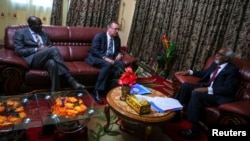A United Nations report says Somalia remains wracked by corruption and internal unrest despite installation of a new central government last year.
The report, written by the U.N. Monitoring Group for Somalia and Eritrea, says 80 percent of withdrawals from the government's Central Bank are made for private purposes and not for the running of government.
It says the withdrawals represent "patronage" and "a set of social relations that defy" Somali state institutions.
The report also highlights what the authors call "spoiler networks" of clans and individuals that fight efforts to extend Somali government authority.
It says Eritrea supports one of these networks and has direct relations with key political figures who act as agents for Asmara's influence. Eritrea has denied previous accusations that it meddles in Somali affairs and supports militant group al-Shabab.
The report warns that developments in Somalia threaten to undermine the central government and the country's peace and reconcilation process.
Somalia has endured more than 20 years of war and lawlessness since the fall of President Mohamed Siad Barre in 1991.
Installation of the new government, led by President Hassan Sheikh Mohamud, and the removal of militant group al-Shabab from Mogadishu sparked hopes for a new era of peace in Somalia.
But al-Shabab continues to carry out periodic attacks, and the U.N. report, released late Wednesday, says the militant group retains most of its military strength, although it avoids direct confrontation by the African Union force in Somalia, AMISOM.
The report, written by the U.N. Monitoring Group for Somalia and Eritrea, says 80 percent of withdrawals from the government's Central Bank are made for private purposes and not for the running of government.
It says the withdrawals represent "patronage" and "a set of social relations that defy" Somali state institutions.
The report also highlights what the authors call "spoiler networks" of clans and individuals that fight efforts to extend Somali government authority.
It says Eritrea supports one of these networks and has direct relations with key political figures who act as agents for Asmara's influence. Eritrea has denied previous accusations that it meddles in Somali affairs and supports militant group al-Shabab.
The report warns that developments in Somalia threaten to undermine the central government and the country's peace and reconcilation process.
Somalia has endured more than 20 years of war and lawlessness since the fall of President Mohamed Siad Barre in 1991.
Installation of the new government, led by President Hassan Sheikh Mohamud, and the removal of militant group al-Shabab from Mogadishu sparked hopes for a new era of peace in Somalia.
But al-Shabab continues to carry out periodic attacks, and the U.N. report, released late Wednesday, says the militant group retains most of its military strength, although it avoids direct confrontation by the African Union force in Somalia, AMISOM.








